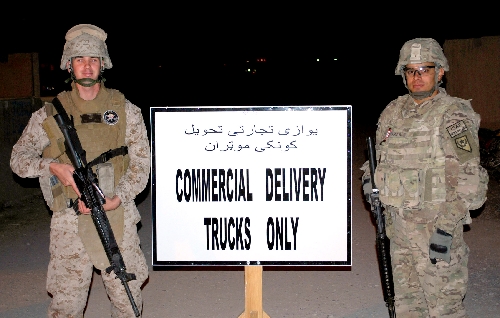At field, force for safety
KANDAHAR AIR FIELD, Afghanistan -- The stillness of a starry night is interrupted only by the occasional truck passing outside the fence line or the shattering sound of a jet taking off from the nearby landing strip. A full moon silhouettes the landscape leading in all directions from this sprawling base.
Go inside the fenced area of an entry control point on the edge of Kandahar Air Field, however, and you are in one of the most potentially dangerous sections of this southern Afghanistan installation.
Vigilant guards allow no pedestrian traffic, only the entrance of delivery and 18-wheeler cargo trucks coming to unload their goods. A multinational, multiservice security force works the control point around the clock. So tight is security, the military prohibits still or video photography inside and mandates that all military personnel and visitors wear body armor and helmets.
Spc. William Frias, a soldier with the 422nd Expeditionary Signal Battalion, knows the dangers of the control point all too well. The Las Vegas guardsman serves as the noncommissioned officer in charge of the containment area for both vehicles and drivers, mostly male and many of whom are coming into the area after a long drive from Pakistan.
"We share security with the Bulgarians, the other host nation," explains Frias, who moved from Chicago to Southern Nevada with his family several years ago.
While American forces patrol on foot, the Bulgarians scan the entire area -- inside and out -- from a control tower, keeping a watchful eye on every movement from the entering trucks. Cameras and visual surveillance are everywhere within the control point. During the day, the Bulgarians take the lead in checking the trucks.
"The delivery vehicles are bringing in food and (bottled) water," says Frias, who works a 12-hour night shift and constantly moves from one section to another during his shift.
Tankers entering the air field must be empty. Once inside, the Army fills them with water to be transported to forward operating bases.
And no vehicles can haul gravel into the control point, Frias says. Soldiers can't easily search through it, and remnants of explosives could still exist in the crushed rock.
"If the dogs smell anything, EOD (Explosive Ordnance Disposal) comes in even if we suspect anything with explosives," he says.
Frias says some nights are stressful, not only with searches but also when the alarm for a rocket attack blares from the elevated speakers.
"We don't go to the bunkers, we go to a fighting position," he says. "We protect the foreign nationals."
Scores of trucks line up outside the control point gate, and drivers entering must go through a methodical procedure and then wait up to 12 hours to receive final approval to enter the base itself.
Frias volunteered for the duty and says the procedures help weed out drivers who may not be "friendlies." (No one has tried to ram the gate during the several months he has been here, Frias says.)
Soldiers or Marines will check a driver's paperwork and identification and verify the purpose of his trip. Then each guard performs a visual scan on all stopped drivers. Most drivers know basic English, but an interpreter is on call at the main building.
From there, the trucks proceed to another point where X-ray equipment scans the content. Drivers go to a sheltered holding area where they undergo an eye scan and search.
Frias, 36, is nearing the end of his third overseas tour, and says it's the unknown that keeps him and others on edge: "Here, danger comes to us."
Some Nevada guardsmen, though, shrug at the possible danger.
Spc. Jerry Rupert of Las Vegas has been at the entry control point for almost four weeks.
"It's not too bad out here," he says. "Nothing bothers me."
Henderson resident Spc. Joseph Colligas agrees. "I was assigned to it," he says of the extra duty. "But I have no anxiety. We're pretty well protected, and it's not too bad. It could be worse."
Assisting the Nevada Army National Guard soldiers is Marine Sgt. D.J. Walsh, a C-130 mechanic from Cherry Point, N.C., who volunteered to serve at the control point. Walsh, who is serving his third deployment to Afghanistan, says both services have good people working the checkpoint.
"I love it. I'd rather be here than fixing planes," he says of the security mission.
Nevada Spc. Visith Tang, who has been with the Guard's cable operation since 2004 and completed two tours to Iraq during that time, has taken his responsibilities to another level. In his spare time, he is learning Pashto, the language of the Afghan people. He started about a month before the unit arrived in the country in March.
"I'm getting used to certain things in the language," he explains from a perch overlooking one of the initial checkpoints. "The language has given me another dimension to talk to the people and know of their problems. It makes me more appreciative of the Afghan people."
Steve Ranson is editor of the Lahontan Valley News in Fallon, where a version of this story originally appeared.

















